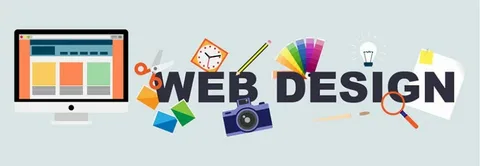Your website is more than just a digital storefront — it’s the face of your brand, the hub of your online presence, and often the first impression potential customers have of your business. While an attractive design is important, design alone is not enough. For a website to truly deliver value, it must support your business objectives.
This is where a professional website design agency comes in. The right agency doesn’t just create a visually appealing site — it ensures that every design choice aligns with your company’s long-term goals, whether that’s increasing sales, generating leads, or strengthening brand credibility.
Let’s explore how a website design agency bridges the gap between creativity and business strategy.
1. Understanding Business Objectives From the Start
An effective project always begins with discovery. A good agency invests time in understanding:
-
What your business goals are (sales, awareness, leads, customer retention).
-
Who your target audience is and what they need.
-
How competitors are positioning themselves.
For example, if your goal is lead generation, the design will prioritize strong CTAs, forms, and landing pages. If your goal is brand authority, the site may focus on professional design, content-rich pages, and thought leadership.
This alignment ensures design is not just about looks but about outcomes.
2. Creating User-Centered Design
Business goals and user needs go hand in hand. A site that ignores the user experience cannot drive results. That’s why agencies rely on UI/UX design principles to keep users engaged and guide them toward conversion.
Key user-focused practices include:
-
Intuitive navigation so visitors easily find information.
-
Mobile-first design to ensure performance across devices.
-
Clear visual hierarchy that highlights key actions like “Contact Us” or “Buy Now.”
When users enjoy the experience, they stay longer, interact more, and take desired actions — helping you achieve your business goals.
3. Designing for Conversion Optimization
At the end of the day, most websites exist to convert visitors into leads or customers. A professional website design agency incorporates conversion-focused elements such as:
-
Strategically placed CTAs that encourage clicks.
-
Landing pages optimized for specific campaigns.
-
Trust-building elements like testimonials, case studies, and certifications.
-
Minimal distractions that keep users focused on the next step.
This balance of creativity and conversion science ensures your website supports measurable results.
4. Integrating SEO Into the Design Process
No matter how beautiful a website looks, it’s useless if people can’t find it. A results-driven agency knows that SEO must be baked into the design process.
This includes:
-
Site structure that search engines can easily crawl.
-
Fast load speeds to improve rankings and user experience.
-
Optimized on-page elements (titles, descriptions, headings).
-
Content strategy aligned with keywords and search intent.
By aligning SEO with design, the agency ensures your website attracts qualified traffic that contributes to your business goals.
5. Building Scalable and Flexible Solutions
Business goals evolve over time, and your website should be able to grow with them. A good agency designs with scalability in mind:
-
CMS platforms that are easy to update.
-
Flexible layouts that can handle new content or features.
-
Integrations with tools like CRM, email marketing, or e-commerce platforms.
This future-proof approach ensures your site continues to support long-term growth.
6. Data-Driven Decision Making
A strong website design agency doesn’t just rely on creative instincts — it uses data to guide design choices. From heatmaps and analytics to A/B testing, agencies leverage data to refine layouts, improve calls-to-action, and enhance user flows.
For example:
-
If analytics show high drop-offs on a pricing page, design adjustments can reduce friction.
-
If heatmaps show users aren’t scrolling, content can be repositioned to capture attention earlier.
This ongoing optimization directly aligns design with business performance.
7. Enhancing Brand Identity
Your website is an extension of your brand. Agencies ensure that every color, font, image, and tone reflects your brand’s identity and values. This consistency builds trust and makes your brand more recognizable.
For instance:
-
A luxury brand might use clean layouts, muted tones, and elegant typography.
-
A tech startup may opt for bold visuals, dynamic graphics, and interactive features.
By aligning brand identity with business goals, the website becomes a powerful storytelling tool.
8. Prioritizing Accessibility and Inclusivity
Today’s businesses must ensure their websites are accessible to all users, including those with disabilities. A forward-thinking agency designs with inclusivity in mind by following accessibility standards (like WCAG).
This not only reflects positively on brand reputation but also expands your audience reach — aligning inclusivity with growth goals.
9. Seamless Integration With Marketing Campaigns
A website doesn’t exist in isolation. It works as part of a bigger marketing ecosystem. An effective agency ensures that your site integrates seamlessly with:
-
PPC campaigns with dedicated landing pages.
-
Email campaigns that link to optimized pages.
-
Social media promotions that connect with targeted content.
This integration ensures all marketing activities contribute toward the same business outcomes.
10. Measuring Success With Analytics
Finally, the most important question: how do you know your website is achieving business goals?
Agencies set up performance tracking using tools like:
-
Google Analytics for traffic and conversions.
-
Heatmaps for understanding user behavior.
-
Conversion tracking for leads and sales.
Regular reporting ensures you can see how design decisions translate into real-world results — whether that’s increased inquiries, sales growth, or improved engagement.
Concluding Thoughts
A website should never just be “pretty.” It must be purposeful. The role of a website design agency is to align creative design with business strategy, ensuring that every element of your site contributes toward meaningful goals. From user experience and SEO to branding and conversions, agencies bring the expertise needed to transform a website into a growth engine.
When design supports your goals, your website stops being just a digital presence and becomes one of your most powerful business tools.
Also Read : Website Design & Development in Buffalo: City Insider Experts Leading the Way
